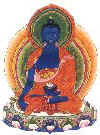|
|
||||
|
Tibetan
Medicine - Tibetan
medicine - How
Maha
Kumbh
Heritage
- Ritu
Kumar - Designing
Exhibition
|
|
|
||
|
the-south-asian.com January 2001 |
||||
|
Page 2 of 3
Tibetan Medicine - How
and Why it Works
(continued from page 1) The seven bodily sustainers are:
To show how this process works, when we eat or drink something, it goes to the stomach, where the Bad-kan will help to mix it, the mKhris-pa will help to digest it and the rLung will help to separate the essential nutrients from the waste products. The essence of the essential nutrients will then form blood, the essence of blood forms muscle tissue, the essence of muscle tissue forms fat, the essence of fat forms bones, the essence of bones forms marrow and the essence of bone marrow forms the regenerative fluid. With the waste products there are three eliminating functions of the wastes:
This process shows how important it is for rLung, mKhris-pa and Bad-kan to be kept in balance. Imbalance of Nyipa sum We now move on to the second of the four categories - the imbalance of Nyipa sum. The long-term causes of the imbalance of Nyipa sum are the three poisons. The short-term causes of imbalance are the time and season, the influence of spirits, improper diet and improper behaviour. With regard to the time and season, rLung arises at dawn and in the evening in summer. mhhris-pa arises during the autumn at midday and at midnight. Bad-kan arises in the spring, in the morning and at dusk. There are innumerable disorders brought about by certain contributory factors or conditions relating to harmful influences or spirits. The 360 female spirit influences are connected with desire and attachment and give rise to rLung. The 360 male spirit influences are connected with anger and hatred and give rise to disorders from mKhris-pa. The 360 klu (Skt. Nagas or water dwelling spirits) and Sa-bdag (specific spirits that govern or haunt particular places) are connected with ignorance and give rise to Bad-kan disorders. If they happen to be disturbed, all these spirits can cause harm, and people would have to consult a lama or tantric practitioner for a divination. Through their help the spirits would be expelled through religious ritual and ceremony. As for improper diet, if someone eats lots of light foods such as pork, goat's meat, milk and yogurt, strong tea, strong coffee, soya, vegetables, pulses, skimmed milk continuously, eating only these kinds of foods every day, they will suffer from rLung problems. If someone drinks lots of milk and alcohol, and eats lots of meat, full-fat cheese, nuts, sugar, ice cream, lard, butter, chocolate, cooks with lots of oil - these cause mKhris-pa problems. When someone eats lots of raw food such as uncooked meat, salad, raw fish, cold drinks, raw milk they will suffer from problems related to Bad-kan. If a person does a lot of fasting and meditation, does not sleep much, takes meats at improper times, has too much sex, strains or over controls his bowel and urinary functions, has lots of mental pressure and tension and talks too much, then rLung will arise. mKhris-pa arises through straining the body such as by carrying heavy loads, digging hard dry soil, running in the middle of the day in the peak of summer, falling through sudden jerks to the body, such as falling off a horse or a roof and accidents. Bad-kan is caused by behaviour such as doing no physical exercise, sleeping for most of the day after eating a heavy meal, taking cold showers every day, exposing your body through inadequate clothing, and working in damp and cold places.
H.H. The Dalai Lama on Tibetan medicine - Tibetan medicine - How and Why it works
|
||||
| Copyright © 2000 [the-south-asian.com]. Intellectual Property. All rights reserved. | ||||
| Home |
